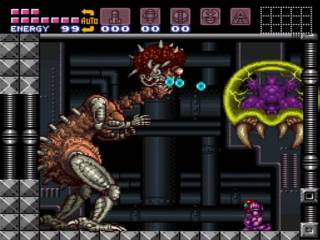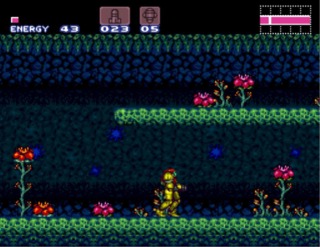Gaming Memories: Super Metroid
By majormitch 0 Comments
Welcome to “Gaming Memories,” a blog series where I reminisce about my favorite video games. I will slowly but surely get to every game on the list, and speak to why each holds a special place in my heart. That not only means I’ll talk about why I think each is a great game that speaks to my tastes, but also where and how it affected me in a larger context. I hope you enjoy, and thanks for reading.
SPOILER WARNING: This blog contains spoilers for Super Metroid.
Super Metroid opens with you, as Samus Aran, investigating a distress signal aboard the Ceres space station. Its halls are eerily quiet, their metallic blue emanating a cold lifelessness as you search for clues, and it doesn't take long to find out just how lifeless the station really is. The primary lab is littered with dead scientists, and a shattered containment tube sits where the last Metroid in the galaxy had been held. It’s clear that someone (or something) has stolen both the lives of these scientists, as well as the precious Metroid. In the next room? Your nemesis, Ridley, who has the Metroid. After a brief duel, and a desperate escape from the self-destructing Ceres station, you chase Ridley to the nearby planet Zebes. Thus begins your adventure to stop Ridley and find the Metroid.

Super Metroid’s opening sits among my favorites in any game, as it effectively sets up what the game is all about in ten minutes. First, by having you engage with some light platforming and fight Ridley (a fight you cannot technically fail), you get to try out both the platforming and combat in a safe space. Second, through its thick atmosphere and detailed environment, it sets up the entire premise of the game’s story with minimal exposition. Third, once you land on Zebes, it’s clear you spend the rest of the game exploring its large world on your own as you search for the Metroid. Super Metroid introduces the game’s core pillars effortlessly, without the extensive tutorials or info dumps required by most games. Not only is that a smooth process that gets the player into the action quickly, it’s also a poignant indicator of Super Metroid’s ethos and artistic ambitions. It goes to great lengths to immerse the player as fully as possible, and the result is that its world feels infinitely more alive and believable than it otherwise would. It all makes exploring Zebes feel highly meaningful, and also lends Super Metroid a surprisingly strong narrative. Its environments explain the game’s happenings quietly but powerfully, which culminates in an all-time classic video game moment. When you finally reunite with the Metroid, which has grown into the titular “super Metroid,” it recognizes you as its original caretaker and sacrifices its life to save and empower you. It’s a dramatic and awesome scene, one that's executed beautifully without a single word.
In 1994, when Super Metroid first released, that kind of freewheeling exploration and atmospheric storytelling was rare. It was not the first game to focus on these things (at the very least it was the third Metroid game), but it’s regularly regarded as the game that codified the “Metroidvania” subgenre as we know it today. Super Metroid gathered up the ideas and experiments of its predecessors, and presented them in a more effective and cohesive way than ever before; in its execution, it was a big step up across the board. Much has been written about Super Metroid’s world design, and for good reason: its world is one of the most elegantly designed in video game history. Its network of hallways and doors, locks and keys, did a wonderful job of regularly nudging the player in the right direction while still leaving room for them to think and explore on their own. That’s a fine line, but Super Metroid walked it splendidly, and Zebes remains one of my favorite video game worlds to date. The strengths of its world went further than its excellent mechanical design too, as its artistic design was equally impressive. It managed to tell a compelling story through its environment alone, and the striking art and moody musical score combined to create a powerful and gripping atmosphere. Its soundtrack in particular ranks high among my personal favorites, and hearing those songs takes me right back to Zebes’ caverns all over again.

Zebes was a world crafted with substantial care and attention to detail, and every aspect of Super Metroid was smartly built around your exploration of it. It’s a holistic approach to game design that I greatly appreciate, and its execution was so strong that new “Metroidvanias” are regularly compared against Super Metroid to this day. It set the standard, and holds up remarkably well decades later. So well, in fact, that it’s almost certainly the game I’ve played from start to finish more than any other. While the nature of its construction lends itself well to speedruns and mastery -- it’s still one of the most popular games to speedrun -- it also speaks volumes to my love of Super Metroid that, as someone who rarely replays games, I manage to replay it every few years. I love the openness of the exploration, and how I always notice new details on every new run. I love the calming sense of isolation and figuring things out on my own. I love the atmosphere, the visual design of each area, and the musical score that perfectly captures the mood. I love the progression of items, thoughtful secrets, eerie boss fights, and how it all comes together for a singular experience; it’s one I’m not sure I’ll ever get tired of.
Four years ago, throughout the summer of 2016, I wrote a lengthy, multi-part blog series about the Metroid franchise and why it’s such an important series for me personally. It’s a series that has resonated with me and my personality as much as any game has; its world design, its atmosphere, its sense of exploration, and even its isolation are all qualities I hold dear. And in its execution, Super Metroid embodies these traits as well as any in the series. It takes my favorite aspects of this entire medium and pulls them together seamlessly into a cohesive whole, and to call Super Metroid one of my favorite video games almost sells it short. There is perhaps no better representative of my gaming tastes than this, and perhaps no other game I love more.
